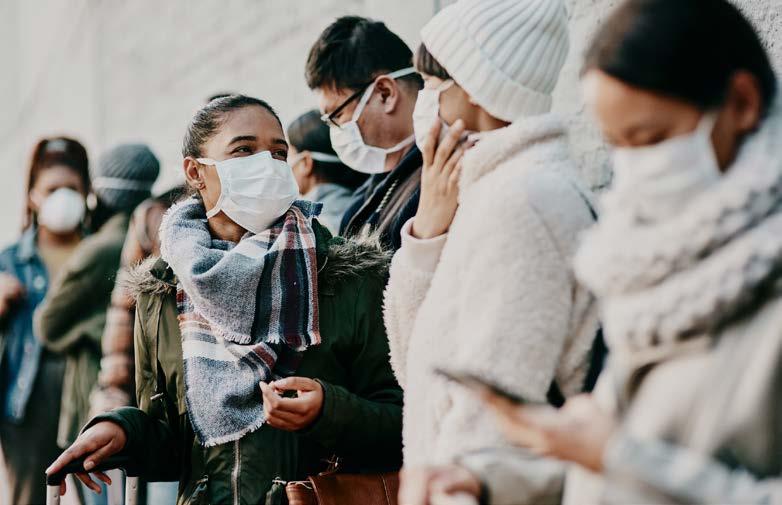
8 minute read
PROJECT ECHO: Reducing Health Disparities in Underserved Communities
BY SALLY PARKER
Haunted by memories of war and genocide in their homeland, many of the Cambodian refugees and immigrants who come to the Metta Health Center at the Lowell Community Health Center in Lowell, Massachusetts, deal with depression, anxiety, and post-traumatic stress disorder. These challenges are daunting in their own right. But they also make it harder to maintain habits that combat diabetes, says Sarah Bradshaw, FNP, a primary care provider in the clinic.
“Diabetes is an interesting disease in that your lifestyle choices make a difference,” says Bradshaw, who has a grant through the Massachusetts League of Community Health Centers to improve health outcomes for Cambodian immigrants with the disease. “A lot of [our work] is focused on encouraging people and helping people believe they can make the lifestyle changes they need to control the disease.”
To learn how to help patients in complex situations like this, Bradshaw turned to Project ECHO, a video-based mentoring model that brings specialist expertise to frontline medical personnel in underserved communities. The Joslin Diabetes Center Inc., a Project ECHO hub, provided the training. “Depending on the diagnosis, you are looking into all different avenues and directions, including nutrition and lifestyle habits,” Omer says. “You try so many different things and you get stuck and you say, ‘What would be my second move?’ Experts help you to look into the different angles and figure out how to achieve the goal for a specific patient, because it has to be patient-centered care.”
ECHO stands for Extension for Community Healthcare Outcomes. It is the brainchild of Sanjeev Arora, MD, a New Mexico gastroenterologist who in 2003 sought a way to treat a surge in Hepatitis C cases across the state. Troubled that many patients traveled hundreds of miles and waited up to eight months to see him, he conceived ECHO to bring specialist knowledge back to the community providers who serve those patients.
ECHO is based at the University of New Mexico. More than 400 partner organizations now replicate the model around the world.

Nearly 100,000 providers have taken webinars in dozens of topics over the years.
ECHO’s mission is to democratize medical care and knowledge. It is one of six finalists tackling critical social challenges in 100&Change, the MacArthur Foundation competition for a single $100 million grant. Nearly 3,700 competition registrants submitted 755 proposals. A winner will be named in spring 2021.
ECHO videoconferencing sessions connect experts in medical hubs with primary care providers who want to deepen their knowledge in specialty areas central to their work, such as pain care, behavioral health, HIV, complex case management, geriatrics, pediatrics, substance use, domestic violence, cancer prevention, tuberculosis, and many more.
A typical session includes a 10- to 15-minute didactic, one or two case presentations, and a discussion among participants. The vibe is collaborative and supportive, says Rekia Omer, RN, clinical care Nurses are accustomed to solving problems— quickly. But solving them all at once is not possible with complex cases, says Mary Blankson, DNP, APRN, FNP-C, chief nursing officer at Community Health Center Inc., a nonprofit agency serving nearly 100,000 patients across Connecticut.
manager at Edward M. Kennedy Community Health Center in Worcester, Massachusetts. During her lunch break, Omer attended a weekly series on diabetes offered by Joslin. She and other providers submitted cases ahead of time, and experts asked questions and offered advice. Fellow providers weighed in with their perspectives.
Most of Omer’s patients are poor. Many are immigrants, and some live on the street. Each patient comes with a unique set of concerns.
“Depending on the diagnosis, you are looking into all different avenues and directions, including nutrition and lifestyle habits,” Omer says. “You try so many different things and you get stuck and you say, ‘What would be my second move?’ Experts help you to look into the different angles and figure out how to achieve the goal for a specific patient, because it has to be patient-centered care.”
Omer, who later became a certified diabetes educator, says the sessions looped in experts who could talk about the specifics. A pharmacist, for example, explained how diabetes medications work, and as a clinical care manager, she shared what she learned with providers in her clinic.
After a session on diabetes care and cost savings—insulin and medication for the disease are notoriously expensive—Bradshaw took back to the clinic tips on how to spot insulin rationing and how to manage cases effectively with both care and cost in mind. She also learned about services that help patients who cannot afford insulin.
“That’s one of the worst situations as a clinician,” Bradshaw says. “You’ve recommended something for the patient and they don’t have the financial resources for it. That’s a really helpless feeling. So I was happy to have some of those resources for my patients, and I actually have done so.”
Nurses are accustomed to solving problems—quickly. But solving them all at once is not possible with complex cases, says Mary Blankson, DNP, APRN, FNP-C, chief nursing officer at Community Health Center Inc., a nonprofit agency serving nearly 100,000 patients across Connecticut. CHC is an ECHO hub, training its own staff and other organizations through the Weitzman Institute, a research and education arm.
One of its most popular webinars is complex case management, a yearlong program that meets twice a month on Zoom. Nurses learn best practices for assessing and prioritizing a patient’s multiple health concerns.
“Sometimes I think this is hard for a nurse. You want to tackle the diabetes, but you have to treat the depression first for a better outcome. You have to be able to tell the patient your A1C is going to be higher for a couple of months while we get the depression under control,” Blankson says.
The ECHO covers ways nurses can make the best use of their time and skills. This may mean tapping team members
to help with routine tasks or setting boundaries and expectations with patients.
“Nurses are a finite resource in the practice where they work, so it’s really important to determine when they’re working harder than the patient,” she says.
With nursing jobs in primary and ambulatory care on the rise, Weitzman in 2015 kicked off a nurse-centric model for the ECHO webinars it offers. The Project ECHO approach is a perfect fit for the work nurses do. It views the patient as a whole person in the context of family and community, says Lois Wessel, MS, RN, CFNP, a professor at Georgetown University’s School of Nursing and School of Medicine. In the rural U.S. and Latin America, Wessel has helped establish “culturally and linguistically appropriate” primary care providers who lead the way as health advocates in their communities.
Of Project ECHO’s four guiding principles—to use technology to leverage scarce resources, facilitate case-based learning, share best practices, and generate patient data to track quality improvement— the last is most difficult.
Most ECHO programs have generated little patient data, Wessel says. A key reason is that progress in many of the areas ECHO sessions now cover— such as autism, depression, and complex care management—is much harder to measure than that of Hepatitis C, the original ECHO focus. (A study found that local providers participating in that first ECHO program achieved Hepatitis C cure rates in their patients equal to those of specialists.)
Nurses could play an important role in tracking down patient outcomes, she says, which could lead to more grants and funding opportunities for further study.
Still, the ECHO model is flexible and robust in important ways. Participants learn from specialists, discuss and solve real cases, and take that expert knowledge back to the office. Afterwards, they can tap into a support network of colleagues who are handling the same issues.
Primary care providers who take a Weitzman ECHO series on chronic pain learn how to have challenging conversations about pain and medication with their patients. They also can log into PainNet, a website Weitzman created with studies, articles, and peer chat forums for support.
“We’re building a knowledge network,” Blankson says. “We’re reminding providers
you’re not alone in this. We’re learning together.”
Like other ECHO hubs around the world, Weitzman facilitates ECHOs for clinics and organizations on a wide range of topics from LGBTQ health to school nursing.
“We want the ECHO model to spread because it’s helpful for everyone. When you really want to share knowledge, particularly with the frontline staff, this is a very effective way to do that,” she says.
Sally Parker is a freelance writer and editor with more than 20 years of experience writing about health care, workplace issues, career development, and education.
How Project ECHO Helps Nurses
Sarah Bradshaw, FNP, was working in hospital administration when she realized she wanted to switch to the clinical side. “I saw a lot of really great nurse leaders making what I perceived to be real differences in our organization,” she recalls. Bradshaw went back to school to earn her RN and, armed with a strong belief in health care for everyone, began working in a community health center. She earned her FNP soon after so she could have more patient interaction. “It’s definitely one of the reasons I wanted to be in primary care. Having relationships with our patients is something that motivates me every day,” she says. Bradshaw is a primary care provider at Lowell Community Health Center in Lowell, Massachusetts. Taking part in Project ECHO webinars offered by Joslin Diabetes Center and others has made her a more effective provider, she says. “Having the ability to hear cases and hear from the experts at Joslin on how to bring the new strategies in caring for people with diabetes back to our population at the center was really important to me,” she says. “The sessions are set up to be conversational. It’s all case-based, and they had questions throughout as the session went on.” She also attended ECHO training sessions on office-based opioid treatment. “I think especially for new clinicians it’s a really awesome opportunity in these small chunks to further your knowledge of things you’re seeing in your clinic every day,” Bradshaw says. “I feel like I’m really able to guide my patients and help them make decisions and support what they’re looking for.”






